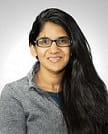
10/31/2022
PITTSBURGH – A new analysis of U.S.-based pediatrics research published over the last decade found that just 9% of studies included non-English-speaking children or families, highlighting a lack of representation that could have serious implications for health equity.
The findings are published today in a JAMA Pediatrics analysis led by University of Pittsburgh researchers.
 “It is frankly unfair and unjust that non-English speakers are not well-represented in pediatrics health research,” said senior author Maya Ragavan, M.D., assistant professor of pediatrics at Pitt’s School of Medicine and UPMC Children’s Hospital of Pittsburgh pediatrician. “This study is a resounding call to action: We need to be more thoughtful and inclusive about how we involve people who speak different languages in our research.”
“It is frankly unfair and unjust that non-English speakers are not well-represented in pediatrics health research,” said senior author Maya Ragavan, M.D., assistant professor of pediatrics at Pitt’s School of Medicine and UPMC Children’s Hospital of Pittsburgh pediatrician. “This study is a resounding call to action: We need to be more thoughtful and inclusive about how we involve people who speak different languages in our research.”
Non-English-speaking communities, often defined as those who speak English less than “very well,” account for about 9% of the U.S. population.
These communities experience health disparities compared with English-speaking communities.
“Research is important for developing innovations to move the needle forward, but if we’re not giving non-English speakers the opportunity to participate in research, then we’re essentially silencing their voices and setting up yet another inequity,” said Ragavan.
 To understand how non-English speakers are included in pediatrics research, Ragavan, first author Annie Chen, B.S., a medical student at Pitt, and their team surveyed papers published between 2012 and 2021 in three high-impact pediatrics journals.
To understand how non-English speakers are included in pediatrics research, Ragavan, first author Annie Chen, B.S., a medical student at Pitt, and their team surveyed papers published between 2012 and 2021 in three high-impact pediatrics journals.
Of 8,142 articles that met their criteria, just 469, or 9%, included non-English speaking participants. Most articles did not mention the proportion of non-English speakers among their participants.
Another 4,127 did not mention language, and the remaining 412 studies specifically excluded participants who were not fluent in English.
“Excluding non-English speakers from health research means that findings are not necessarily representative of the whole community,” said Chen. “Diversity in research not only makes science better, but it also helps to dismantle structural barriers.”
One glimmer of hope was that the proportion of studies that included non-English speakers increased slightly over time from about 8% in 2012 to 12.5% in 2021.
Of the 469 articles that included non-English speakers, 75% included Spanish speakers, making it the most common other language. Nearly a third of the articles did not specify which non-English language was included in the study.
Oral information was usually conveyed to non-English speaking participants through a research team member who spoke the same language or an interpreter, and written materials were usually translated. Notably, only one-third of studies provided details on how researchers communicated with participants.
“Inclusion is not enough,” said Ragavan. “We need to be more thoughtful about how we’re including speakers of different languages in research studies.”
The researchers recognize that including non-English speakers isn’t always easy. For example, translation services are often expensive, and attracting different communities to register for research studies can be challenging.
“I think it’s important for researchers to think about their study question and the population that they’re serving,” said Chen. “We also need to think about how institutions and funding agencies can encourage and support researchers to do this work well.”
Many funding agencies require that researchers be specific about how they include different genders and minoritized groups, but the same is not usually true for language inclusion.
Ragavan says that funders and journals could consider requiring researchers to specify how they plan to include speakers of different languages in studies and how they report this information in publications.
The researchers also suggest that funders could offer bonus grants for inclusive research, and institutions could make translation services available for commonly spoken languages in their region.
They also emphasize the need to make training available for researchers on best practices for including non-English speakers.
Other authors who contributed to the study were Sabrina Demaestri, B.A., Kansas City University; Kelsey Schweiberger, M.D., Jaime Sidani, Ph.D., M.P.H., Riley Wolynn, B.S., Diego Chaves-Gnecco, M.D., M.P.H., Scott Rothenberger, Ph.D., and Erin Mickievicz, B.A., all of Pitt; Raquel Hernandez, M.D., M.P.H., of Johns Hopkins All Children’s Hospital; and John D. Cowden, M.D., M.P.H., of Kansas City University and Children’s Mercy Kansas City.
This research was supported by the National Center for Advancing Translational Sciences (TR001856), the Health Resources & Services Administration (T32 HP22240), the University of Pittsburgh Collaboration in Addiction Training Scholars program (K12DA050607) and the American Heart Association (20CDA352260151).
Top right photo:
PHOTO DETAILS: (click images for high-res versions)
CAPTION: Maya Ragavan, M.D., assistant professor of pediatrics at Pitt’s School of Medicine and UPMC Children’s Hospital of Pittsburgh pediatrician
CREDIT: UPMC
Bottom right photo:
PHOTO DETAILS: (click images for high-res versions)
CAPTION: Annie Chen, B.S., medical student at the University of Pittsburgh (CREDIT: University of Pittsburgh School of Medicine)
CREDIT: University of Pittsburgh School of Medicine
















